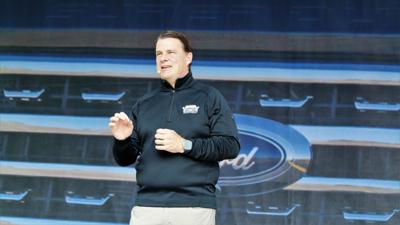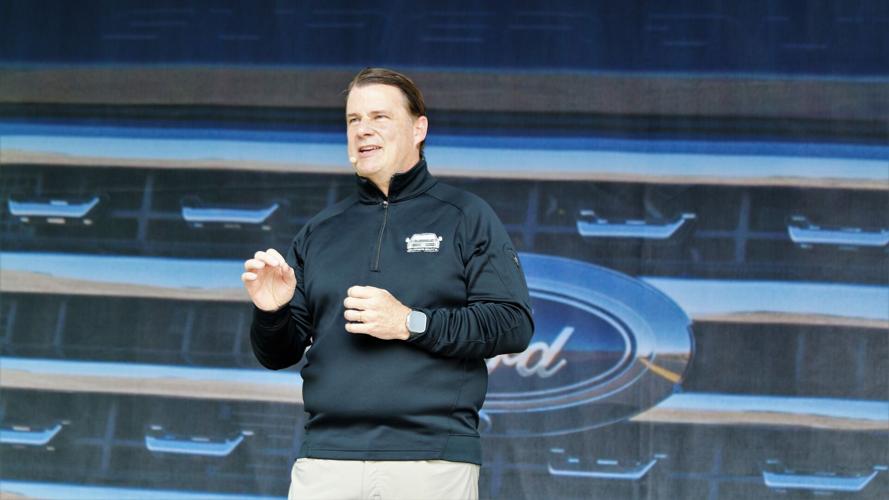LOUISVILLE, Ky. (WDRB) -- When the UAW took down Ford’s Kentucky Truck Plant in Louisville — the company’s biggest and most profitable facility — during last year’s labor strike, it was a bare-knuckled move that helped the union extract a rich and record-breaking labor contract from the automaker.
But the strike of Kentucky Truck was also "a watershed moment" prompting Ford to "think carefully" about its manufacturing footprint, Ford CEO Jim Farley said at an investor conference Thursday.
Farley said Ford has long prided itself on employing more UAW members (57,000) than its Detroit competitors — who have moved a lot manufacturing to Mexico — and on having "the best relationship" of the automakers with the union.
"Our reliance on the UAW turned out to be — we were the first truck plant they shut down," Farley said during the Wolfe Research Global Auto Conference in New York. "And that was a moment for us. Clearly, our relationship has changed."
A spokesman for UAW President Shawn Fain didn’t respond to a request for comment Thursday.
Shutting down Kentucky Truck Plant — which makes six-figure Super Duty pickups and large SUVs — for two weeks last October helped the UAW ink a generous deal with Ford and its counterparts, General Motors and Stellantis.
The Ford deal raises typical hourly rank-and-file wages from $32.05 to $42.60 over the course of the four-year deal while knocking five years off the previous eight-year grow-in period for new hires to reach those wages, according to the Center for Automotive Research.
While the union didn’t restore traditional pensions, it won retirement contributions worth 10% of pay to 401(k)-style plans, up from 6.4% previously.
Those and other gains for workers will raise Ford’s cost to produce each vehicle by $500 immediately and $900 over the life of the labor contract, according to Wolfe Research’s Rod Lache.
Historically, Ford has incurred higher costs to build all its trucks in the U.S., but the company has considered those to be "the right kind of cost," Farley said.
"As we look at this EV transition and our (gas engine) business lasting longer and our truck business being more profitable, we have to think carefully about our (manufacturing) footprint," he said.
Farley didn’t articulate any specific plans, and whether Ford’s factory footprint actually changes in big ways remains to be seen.
"Ford is the No. 1 employer of UAW-represented autoworkers and the only automaker to add thousands of UAW-represented jobs since 2007," a Ford spokeswoman said in a statement. "We also continue to invest in our UAW-represented plants during one of our biggest-ever new product launch years in the U.S. – with new F-150, Ranger, Explorer, Expedition, Lincoln Navigator and Lincoln Aviator all launching this year. As Jim said, we will continue to build a strong business with the right cost structure and manufacturing footprint.”
As part of the UAW contract, the company also committed to $8 billion in investments in its U.S. plants. Ford has historically kept those commitments.
In Louisville, Ford committed to spend another $750 million at Kentucky Truck — an important profit center for the company — to continue making Super Duty pickups and introduce hybrid-electric versions the Expedition and Lincoln Navigator.
Across town at Louisville Assembly Plant, the future is less certain. Ford plans a $1.2 billion makeover of the plant to produce a yet-to-named "all new" electric vehicle. The plant makes the Ford Escape compact SUV, which is now an entry-level model for Ford but reached its sales peak in 2017.
Yen Chen, chief economist for the Michigan-based Center for Automotive Research, wrote in a recent brief that Canada and Mexico's auto segments grew faster than the U.S.'s last year and that those countries remain a viable option for American automakers looking to reduce costs.
Otherwise, Chen said, U.S. automakers may not be able to play in lower-cost vehicles -- only high-dollar trucks.
"The escalation in labor costs limits the vehicle segments in which the companies can compete profitably, leading to a diminished market share overall," he said.
Farley revealed last week that Ford is, in fact, trying to develop a low-cost and profitable EV. He said a "skunkworks" team inside the company has been working on the challenge in secret for a couple of years.
"Our data shows that EVs are a clear destination for many customers based on their unique duty cycle. It's going to take time more than we expected 18 months ago," he said during the company's Feb. 6 earnings call.
Updated Feb. 16 with statement from Ford.














